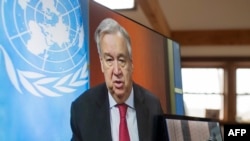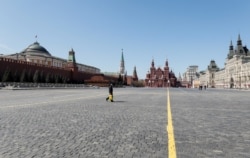The United Nations Secretary-General said in an interview with the BBC that it is a “tragedy” that the world’s leaders have not been able “to come together to face COVID-19 in an articulated coordinated way.”
Antonio Guterres said, “Each country went with its own policy, different countries with different perspectives, different strategies and this has allowed the virus to spread.”
The U.N. chief said “It’s obvious we lack leadership” in the fight against the virus. He urged the world’s “key countries . . . to come together and to have a common strategy and then to bring with them the whole of the international community.”
The U.N. estimates that 8% of the world’s population, about 500 million people, could be forced into poverty by year’s end because of the devastation brought by the virus.
The global tally of coronavirus cases continues to creep upwards.
The Johns Hopkins Coronavirus Resource Center said early Friday there are more than 3.2 million confirmed cases worldwide with more than 233,000 deaths.
The United States leads the world in the number of reported cases and deaths. Hopkins says the U.S. has over a million COVID-19 cases - approximately a third of the world’s total. More than 63,000 people have died in the U.S. from the virus.
British Prime Minister Boris Johnson said Thursday that Britain is past the peak of the coronavirus outbreak and the number of new infections is on a downward slope.
In his first major address after recovering from COVID-19, Johnson said he would announce a plan next week on how the country’s economy and lifestyle are to move forward after the pandemic that has killed close to 27,000 people in Britain and infected about 172,500.
Johnson is optimistic about a coronavirus vaccine being developed by Oxford University scientists and the British drug company AstraZeneca. If the vaccine proves to be effective, it could become widely available worldwide this fall.
Many European countries have already begun gradually reopening or have plans to do so in the coming days. The economy in the eurozone – European countries that use the common euro currency – shrank a record 3.8% in the first quarter of the year.
Meanwhile, Russian Prime Minister Mikhail Mishustin announced Thursday he had tested positive for the coronavirus. State television showed his video call with Russian President Vladimir Putin. Mishustin will be replaced by First Deputy Prime Minister Andrei Belousov while he is in self-isolation.
Russia has more than 106,000 COVID-19 cases and more than 1,000 deaths, according to Johns Hopkins. The country’s economy has been hit by huge losses in oil revenue resulting from the global oil glut caused by worldwide shutdowns.
Russia’s Tass news agency quoted Putin on Thursday as saying the country’s economic recovery plan must consider a new reality.
“We know the world is changing. The crisis relating to the coronavirus pandemic has influence on the key markets, on the system of cooperative ties. Companies, including Russian ones, are looking for and quickly implementing fundamentally new business models,” Putin said.
The U.S. government also is looking for ways to restart its economy, which suffered a 4.8% loss in the first quarter, with more than 30 million unemployment claims filed in the past six weeks.
The Trump administration is not planning to extend federal coronavirus restrictions that expired Thursday, focusing instead on its efforts to work with states on plans to reopen the country.
U.S. governors have been deciding when and at what pace to relax restrictions on nonessential businesses and group gatherings and end stay-at-home orders in their states. Some states have already begun phasing out those restrictions, even though the pandemic remains rampant.
Discussions about relaxing lockdown orders are also taking place in Asia. In Japan, Prime Minister Shinzo Abe said Thursday his government is consulting experts about whether to extend a state of emergency that is set to expire May 6.
Japan has about 14,000 confirmed COVID-19 cases, and Abe said the situation remains “severe.”
U.N. humanitarian chief Mark Lowcock told the Security Council that there are 44 confirmed cases and four deaths in Syria, a country he said cannot be expected “to cope with a crisis that is challenging even the wealthiest nations.”
In Yemen, health officials reported the country’s first two coronavirus deaths, as well as a cluster of new cases in the southern port city of Aden that has been a focal point in a five-year civil war.
The World Bank said developing countries would be hardest hit, particularly those in sub-Saharan Africa, where nearly half of the continent’s job losses have occurred.
It also said the economic downturn in South Asia would likely be the region’s worst in 40 years.











